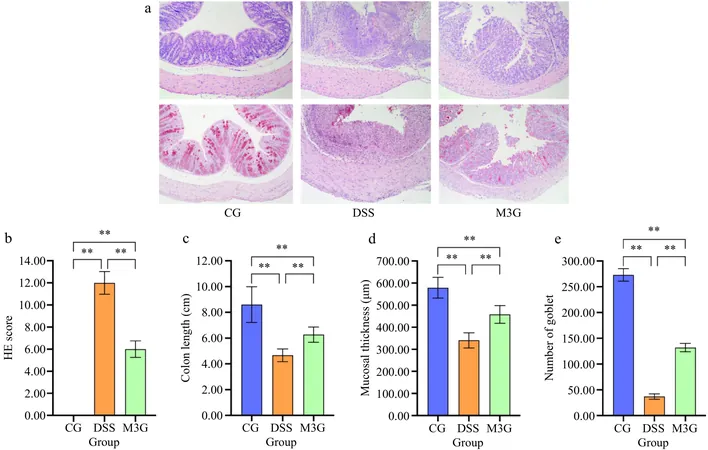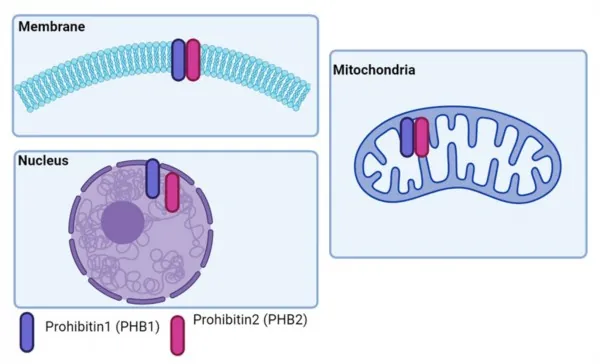
Blueberry Compound Breakthrough: Nature's Answer to Colitis?
2024-09-25
Introduction to M3G
A groundbreaking study from Shenyang Agricultural University, led by the renowned Dr. Bin Li, has unveiled an exciting prospect in the realm of digestive health: malvidin-3-O-galactoside (M3G), a powerful compound derived from blueberries, may hold the key to enhancing the colonic mucosal barrier function and alleviating the distressing symptoms of colitis.
The Role of the Colonic Mucosal Barrier
As we dive deeper into digestive health, it's crucial to recognize the colonic mucosal barrier's role—it acts as a shield, protecting the body from harmful pathogens and reducing the risk of inflammation. Blueberries have long been celebrated for their numerous health benefits, particularly due to their rich content of anthocyanins, like M3G. While previous research hinted at the beneficial effects of anthocyanins on gut microbiota and inflammation, the specific effects on the colonic mucosal barrier had remained largely uncharted.
Research Methodology
In a recent study published in Food Innovation and Advances, researchers used a mouse model of colitis induced by dextran sulfate sodium (DSS), simulating the challenging inflammatory bowel conditions experienced by many. The assessments included monitoring body weight, disease activity index (DAI), and overall food consumption, providing a comprehensive picture of the health effects experienced by the mice.
Findings and Implications
Mice treated with M3G displayed remarkable improvement, with increased body weight and significant reductions in DAI scores when compared to untreated control subjects grappling with DSS-induced colitis. This suggests that M3G offers a protective effect against the acute symptoms of colitis. Pathological examinations of colon tissues revealed alarming damage in DSS-treated mice, but supplementation with M3G resulted in significantly reduced epithelial injury. The analysis showed enhanced mucosal thickness and an increase in goblet cells, indicative of an improved physical barrier function. Further molecular studies confirmed that M3G boosted the expression of key barrier-related proteins, strengthening the gut's defense mechanisms.
Immune Barrier Function and Signaling Pathways
Moreover, M3G seemed to enhance immune barrier function, with increases in secretory immunoglobulin A (SIgA) levels and notable reductions in the percentages of activated CD4+T and CD8+T cells—both of which correlate with inflammatory responses. Intriguingly, M3G was found to inhibit the over-activation of the Notch signaling pathway—an important regulatory mechanism in cell differentiation and organ function—suggesting that M3G's protective impacts may be mediated through this pathway.
Expert Insights and Future Research Directions
Our findings highlight the considerable therapeutic promise of M3G in optimizing colonic barrier function," stated Dr. Xinyao Jiao, the senior researcher on this project. "This research adds significant weight to the evidence surrounding the role of anthocyanins, particularly M3G, in fostering gut health through their modulation of critical pathways.
Conclusion and Future Prospects
With the potential power of blueberries now illuminated, M3G emerges as a promising, natural solution for enhancing intestinal health and combating colitis symptoms. However, experts emphasize that ongoing research will be essential in exploring the full extent of its therapeutic potential and addressing existing hurdles to its widespread clinical application.
As we continue our quest for natural remedies, M3G from blueberries stands out as a beacon of hope for those suffering from digestive ailments, advocating for a plant-based approach to gut health that could redefine our understanding of nutritional therapy. Stay tuned for further advancements in this exciting area of research!


 Brasil (PT)
Brasil (PT)
 Canada (EN)
Canada (EN)
 Chile (ES)
Chile (ES)
 España (ES)
España (ES)
 France (FR)
France (FR)
 Hong Kong (EN)
Hong Kong (EN)
 Italia (IT)
Italia (IT)
 日本 (JA)
日本 (JA)
 Magyarország (HU)
Magyarország (HU)
 Norge (NO)
Norge (NO)
 Polska (PL)
Polska (PL)
 Schweiz (DE)
Schweiz (DE)
 Singapore (EN)
Singapore (EN)
 Sverige (SV)
Sverige (SV)
 Suomi (FI)
Suomi (FI)
 Türkiye (TR)
Türkiye (TR)